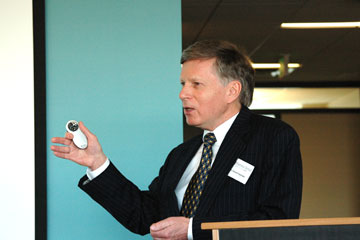
Professionals entering global energy system need a holistic understanding of the industry, Kaminski says

Students who gain a big-picture understanding of the global energy system will find a wealth of job prospects in the evolving energy industry, Vincent Kaminski, Ph.D., told a CU Denver Business School audience on Feb. 13.
“I tell my students that if they choose to specialize in energy, they cannot make a wrong decision,” said Kaminski, a professor in Rice University’s business school. He qualifies that by saying energy professionals need to be “renaissance” by operating across all three layers of the integrated system — physical (production, transportation, storage, etc.), financial (where energy prices are formed), and socio-political (regulatory frameworks).
Kaminski has worked for Citigroup, Sempra Energy Trading, Reliant Energy, Citadel Investment Group and Enron (1992-2002), where he was head of the quantitative modeling group. He has written numerous books, including his most recent, “Energy Markets.” He visited CU Denver as part of the Anadarko Speaker Series, through the Business School’s J.P. Morgan Center for Commodities. The CU Denver Business School is also home to the innovative Global Energy Management program.
Kaminski began his talk on “The Outlook for Energy Trading and Risk Management in the Altered Marketplace” by discussing the properties of energy markets.
In the last 20 years, energy markets have evolved into a highly integrated and global system with increasing amounts of price volatility, Kaminski said. “The integrity and efficiency of energy markets is extremely important to the success of our economy,” he said. “This is something that is taken for granted, and the public doesn’t really understand how complex the system of production, transportation and distribution of energy commodities is.”
That is, until something goes wrong, “and then everybody complains.”
Kaminski said the challenges to risk management arising from the properties of energy markets include:
- A shortage of skilled traders and risk managers who understand the entire interconnected system;
- The system needs people who can manage this environment;
- Multiple software platforms for different commodities complicate the task of holistic risk management; and
- Huge volumes of data that need to be analyzed.
Lastly, he addressed the educational challenges confronting the industry. Considering that energy professionals need to be able to navigate the industry’s many complex layers, “the task of figuring out the right (educational) model is very difficult.”
Academic programs can be specialized for various parts of the industry, he said, “but the problem is that one can’t be an effective accountant if one doesn’t understand this big picture. My emphasis is on understanding the big picture in order to be effective.”
The key is for both industry and academic institutions to innovate and experiment, Kaminski said. “It’s very important to keep the channels of communication open between industry and academia open,” he said. “It will really benefit the students, who will have better job opportunities, and it will benefit the industry, which in turn will benefit the economy.”
Because of the volatility of the industry — and the way disruptive technologies will exert constant change — the more entrepreneurial and adaptive a professional is the better. “The industry will have to hire people who can manage energy risk and understand both the physical and financial markets, and understand the regulatory ramifications of the decisions they make,” he said.


